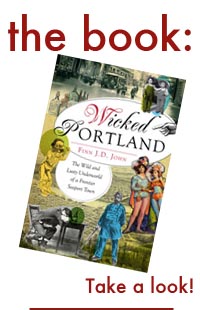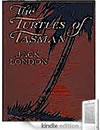Wolf Creek Inn was writing retreat for Jack London
It was also a fishing retreat for Clark Gable and other Golden Age Hollywood notables — and, earlier, a place for cowboys to crash
By Finn J.D. John — April 4, 2010
This short video by Grant McOmie of Travel Oregon's "Grant's Getaways" gives some
additional information about the Wolf Creek Inn.To see more of McOmie's work, see
the Travel Oregon site at https://traveloregon.com/trip-ideas/grants-getaways/ .
There were times, during Hollywood’s golden age, when Clark Gable simply couldn’t be found anywhere.
Studio executives would search frantically for the top-shelf star, needing to talk to him about a project and facing a tight deadline. He’d be gone.
In fact, he’d be fly-fishing on the Umpqua River in Oregon, while staying in a small inn that today is the oldest continually operating hotel in the state: The Wolf Creek Tavern.
A "first-class hotel" with an outhouse
The Tavern got its start in 1883, when pioneer Henry Smith built the “Six Bit House” on the stagecoach road used for folks traveling the Oregon Stage Coach line between Portland and Sacramento. Four years later, he built a bigger inn right across the street – a “first-class hotel” featuring 16 guest rooms, separate men’s and ladies’ parlors and a nice dining room. There were no bathrooms; each room came with a bowl and pitcher of clean water, and a “deluxe privy” stood just outside the back door. The meaning of “first class” has, it appears, changed in the intervening years.
A "tavern" that served no alcohol
So, too, has the meaning of “tavern.” This new place was called the Wolf Creek Tavern, but it served no alcohol. Today, the original Six Bit House is gone.
The stagecoach stopped running in 1887, the same year the tavern was built, because a railroad link to Sacramento made it obsolete. But Highway 99 followed the same route, and the hotel business remained brisk.
Hollywood takes notice; so does Jack London
It got even brisker after word of the Tavern’s charms reached Hollywood. In addition to Gable, the inn’s guest register includes the names of Mary Pickford, Douglas Fairbanks Jr., Orson Welles and Carole Lombard. Other notables who have stayed there included Sinclair Lewis, then-President Rutherford Hayes and Jack London. London was a regular guest, staying with his wife in a tiny room over the front porch while he worked; he wrote a short story titled “The End of the Story” and put the finishing touches on the manuscript for “Valley of the Moon” while staying there. Nearby London Peak is named in his honor.
Cowboys in the attic
Other guests left their mark on the Tavern in a different way. Working cowboys needed a place to sleep while traveling through the area, but couldn’t cough up six bits (75 cents) for a night’s stay. So Smith let them sleep in the attic for a dime a night. But the attic wasn’t fully floored: there was only a shelf of sorts around the perimeter, two or three boards wide. So to keep from rolling off this shelf and crashing through the board-and-batten ceiling into some unsuspecting guest’s room, the cowboys would jam their spurs into the rafters. The marks from these spurs, left 125 years ago, can still be seen.
State parks department buys inn
The Tavern was a successful enterprise for most of its life. Its closest brush with disaster came after Interstate 5 took all the traffic off Highway 99, in the 1960s. Still, partly because it’s just a few hundred yards off I-5, it managed to survive until 1975, when the Oregon Department of Parks and Recreation bought it and started a complete, historically accurate restoration – completed in 1979.
Since then, the parks department has operated it – either directly or through concessionaries – with an eye for historical accuracy. The rooms now have private bathrooms, but otherwise they’re just like they were 100 years ago. There are no TVs, although there is WiFi in the hotel. The restaurant is particularly nice, trimmed and decorated just as it was a century ago, and it enjoys a really good reputation.
Two rooms in particular are not available to stay in, though. The huge room that movie stars used to stay in has been set up just as it was when Clark Gable was expected – right down to the whisky decanters full of what looks like Scotch – and roped off as a museum-like tableau. The same has been done with the closet-sized, very-basic Jack London room, just a few steps down the hall. The contrast between them is striking – and, if you happen to be a novelist, maybe a little depressing.
(Sources: Bannan, Jan Gumprecht. Oregon State Parks: A Complete Recreation Guide. Seattle: Mountaineers, 2002; John, Finn. “Historic Wolf Creek Tavern,” Travelin’ Magazine, August 1999; www.thewolfcreekinn.com.)













